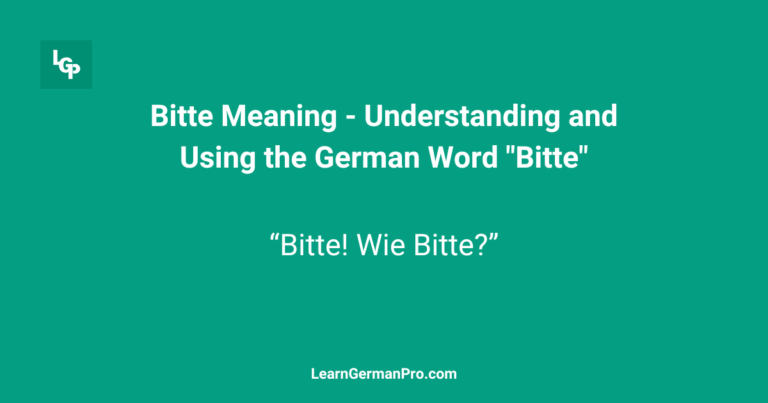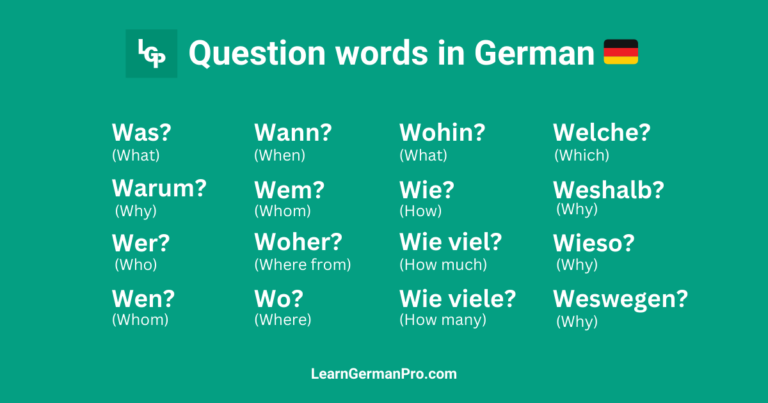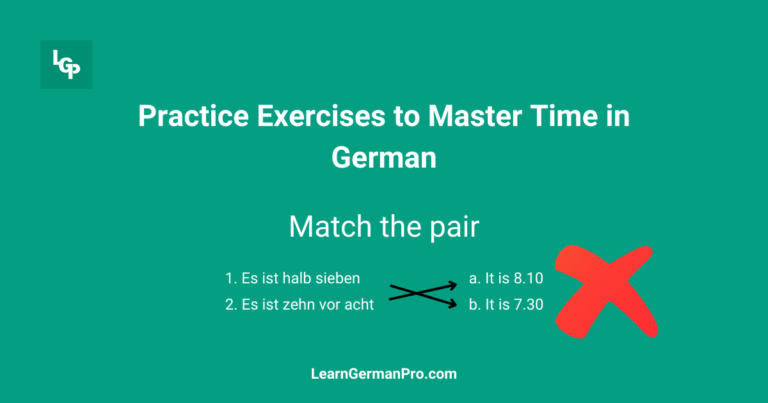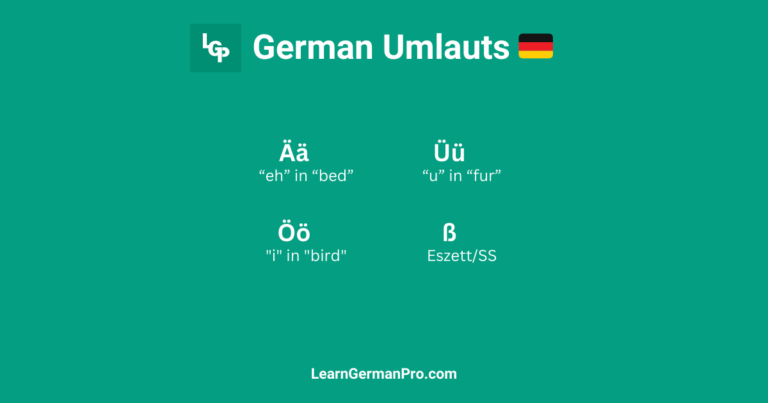Weil Sentences in German Exercises with Answers
The world is beautiful because of the beautiful people like you. Well I am not kidding here, seriously! This sentence that you just saw (with because) signifies something and that is cause and effect. We have a similar word for because in German language, Weil. It is mainly used to explain why something happens. It is important to know how to use weil correctly in building more complex sentences in German, especially when are starting at the German language A1 level. In this blog post, we’ll break down the structure of “weil” sentences, give you tips for mastering them, and provide some exercises to practice!

How to Use “Weil” in a Sentence
In German, the word “weil” introduces a subordinate clause, meaning it sends the verb to the end of the clause. The word order in these sentences differs from simple main clauses in German.
Structure:
- Main clause, weil + subject + other elements + verb (at the end).
Here’s a step-by-step breakdown of how to use weil in German:
- Start with the main clause (regular word order).
- Insert “weil”, which introduces the reason or cause.
- Move the verb to the end of the subordinate clause.
Example:
- Ich gehe nicht schwimmen, weil es regnet.
(I’m not going swimming because it’s raining.) - Ich habe keine Zeit, weil ich arbeiten muss.
(I don’t have time because I have to work.)
Common Mistakes to Avoid
- Forgetting the verb at the end: In “weil” sentences, the verb should always come at the last position in the subordinate clause.
- Mixing up the word order: When you’re learning “weil” sentences, it can be easy to accidentally place the verb in the middle of the sentence, like in an English sentence structure. Be careful and watch out for this!
Practice Forming Weil Sentences in German Exercises
Here are a few exercises to help you practice “weil” sentences and get comfortable with this important structure.
1. Complete the Sentences:
Fill in the blanks with a proper reason using “weil”:
- Ich bin müde, ________ .
(I am tired because I went to bed late last night.) - Wir bleiben zu Hause, ________ .
(We are staying at home because it is raining.) - Lisa kommt nicht zur Party, ________ .
(Lisa is not coming to the party because she is sick.) - Ich trinke Kaffee, ________ .
(I drink coffee because I have to stay awake.) - Peter hat kein Geld, ________ .
(Peter has no money because he lost his job.)
2. Match the Pairs:
Match the main clause with the correct weil sentence.
| 1. Ich bin glücklich (I am happy because I am on vacation.) | a) weil sie krank ist. |
| 2. Er ist traurig (He is sad because he lost his keys.) | b) weil ich Urlaub habe. |
| 3. Maria bleibt im Bett (Maria is staying in bed because she is sick.) | c) weil er seine Schlüssel verloren hat. |
| 4. Wir essen Pizza (We are eating pizza because we don’t feel like cooking.) | d) weil wir keine Lust zu kochen haben. |
| 5. Du kommst zu spät (You are late because you missed the bus.) | e) weil du den Bus verpasst hast. |
3. True or False:
Determine whether the following sentences are grammatically correct:
- Ich esse Obst, weil es gesund ist.
- Er geht ins Kino, weil er mag Filme.
- Sie lernt Deutsch, weil sie in Deutschland arbeiten will.
- Wir bleiben zu Hause, weil es ist kalt draußen.
- Ich mache Sport, weil ich bleiben fit will.
4. Rearrange the Words:
Put the words in the correct order to form a proper “weil” sentence:
- Ich / muss / weil / lernen / morgen / ich / Prüfung / habe / eine.
(I have to study because I have an exam tomorrow.) - Er / weil / Pizza / isst / er / Hunger / hat.
(He is eating pizza because he is hungry.) - Ich / nach Hause / gehe / weil / ich / müde / bin.
(I am going home because I am tired.) - Wir / bleiben / weil / wir / den / Film / zu Ende / sehen / wollen.
(We are staying because we want to finish watching the movie.) - Sie / kommt / weil / sie / einen Termin / hat / nicht.
(She is not coming because she has an appointment.)
Answer Keys:
- Complete the Sentences:
- Ich bin müde, weil ich gestern spät ins Bett gegangen bin.
- Wir bleiben zu Hause, weil es regnet.
- Lisa kommt nicht zur Party, weil sie krank ist.
- Ich trinke Kaffee, weil ich wach bleiben muss.
- Peter hat kein Geld, weil er seinen Job verloren hat.
- Match the Pairs:
1 – b
2 – c
3 – a
4 – d
5 – e - True or False:
- True
- False (Correct: weil er Filme mag)
- True
- False (Correct: weil es kalt draußen ist)
- False (Correct: weil ich fit bleiben will)
- Rearrange the Words:
- Ich muss lernen, weil ich morgen eine Prüfung habe.
- Er isst Pizza, weil er Hunger hat.
- Ich gehe nach Hause, weil ich müde bin.
- Wir bleiben, weil wir den Film zu Ende sehen wollen.
- Sie kommt nicht, weil sie einen Termin hat.
Tips for Mastering Weil Sentences in German
- Practice with Flashcards: Create flashcards with different main clauses and reasons. Practice matching them to form correct “weil” sentences in German.
- Listen and Repeat: Watch German videos or listen to podcasts where “weil” is used frequently. Repeat the sentences out loud to build confidence.
- Write Your Own Sentences: Think of reasons for your daily actions and practice writing them down using “weil”. For example, Ich gehe joggen, weil ich fit bleiben will.
Conclusion
So understanding how to form sentences with weil is a key step towards mastering German grammar. As you progress in your German language learning, you’ll find that weil sentences allow you to communicate with more complex ideas and also explains your reasoning effectively. With practice and the exercises above, you’ll be able to craft weil sentences confidently in no time!
Happy learning! Viel Erfolg!






